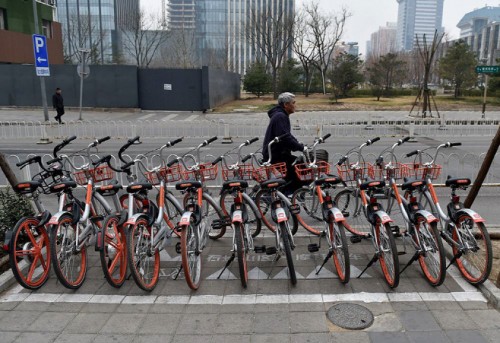By Hong Soon-do, Beijing correspondent, AsiaToday
Bike-sharing is booming in China. It seems the bike-sharing market won't stop growing for a while with a lot of small bike-sharing startups emerging these days.
The market situation shows how rapidly the market is growing. Most of all, the number of bike-sharing companies is quite surprising. According to sources in Beijing on Monday, there are about 40 shared-bike start-ups in the country. We should also take note of the biggest operator, Ofo, which was launched in 2014 and is now valued at over US$2 billion. The market size was only 1.2 billion yuan last year, but it is certain that it will grow more than 8 times this year, exceeding 10 billion yuan. The number of users is also expected to skyrocket from 28 million last year to 300 million this year.
 |
| Shared bikes are lined up in a street in Beijing. It seems to be showing that the shared bike market is exploding./ Source: Xinhua News Agency |
As a result, the market is overflowing with investment funds. The industry estimates that at least 60 billion yuan worth funds are seeking investment outlets. ICT critic Zhou Ying said, "There are a lot of angel funds in China that are looking for investment outlets. If the idea is good enough, you don't have to worry about the money you need to start a business." He said that the shared bike market is seen as the most popular industry for investors.
In fact, the shared bike system, where a user receives a password via smartphone to unlock a bike, is a result of ideas. Besides, it is only about 1 yuan per 30-minute ride, making the growth potential of the market unlimited. There are many reasons why the market is booming and is spotlighted as a promising investment sector.
However, there is also a dark side. Above all, users are leaving bikes anywhere, spoiling the beauty of the city. We should also mention that competition is getting increasingly fierce. This means that sooner or later, bike-sharing companies would go bankrupt one after another, placing a significant burden on the country's poor economy.
We should also take note of the side effects of the explosive use of bikes that are not suitable for roads designed more for cars than bikes. Traffic accidents are a typical example. In fact, the number of accidents between automobiles and bicycles have been noticeably increasing throughout the country since last year. But despite these side effects, China's bike-sharing market is likely to grow further considering that the market is still at the early stages.
#China #bike-sharing #Ofo
Copyright by Asiatoday
Most Read
-
1
-
2
-
3
-
4
-
5
-
6
-
7





















